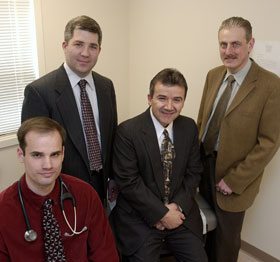Program Offers Medical Students Real-World Experience
 |
| Cullin Jumper, left, a medical student, with mentors Drs. Richard Guerriere, Antonio Scappaticci, and Charles Licata at their practice in Bristol. Jumper’s weekly visits are part of a training program in primary care. |
|
Photo by Peter Morenusy |
Every Thursday afternoon, medical student Cullin Jumper drives to Bristol to “practice medicine” in the offices of Drs. Antonio Scappaticci, Charles Licata, and Richard Guerriere.
Ten years ago, Dr. Guerriere was doing the same thing. An alumnus of the UConn School of Medicine, Guerriere was the first medical student to be mentored at the Bristol practice, and the group has continued mentoring students ever since.
“This is the first time one of our graduates has joined the medical practice where he also trained,” says Karen Harrington, director of student continuity practice. “Now Dr. Guerriere is giving back to the community and to his alma mater by taking on the role of preceptor for Cullin Jumper.”
Jumper’s weekly excursions are part of a three-year training program in primary care, known as student continuity practice, that is a requirement for all medical students. Students spend a half-day each week with their preceptor during the academic year.
The program offers students a mentoring experience at a community-based general practice, where they develop both a theoretical understanding of medicine and the skills they will need as physicians, such as recording patient histories, conducting physical exams, and developing clinical reasoning.
It also provides students with exposure to personal and professional issues that are part of medical training and practice. For Jumper, who is in his second year of training, “pathophysiology is emphasized in the classroom, and physical exam and complete medical history skills are practiced and honed at the office,” Harrington says. “The two complement and build on each other.”
When Jumper made his first visit to the Bristol practice, he didn’t know what to expect. “I remember just being nervous and not knowing what I was doing,” he says. “I’m surprised by how much I’ve learned during the past year and a half, and how much more comfortable I am in the office and with patients. I’m lucky to have the SCP site that I do. All three of the doctors know what I should be learning, and they all enjoy teaching me whenever they have the chance.”
For Guerriere, working with Jumper is a bit like looking in a mirror. He says his own experience as a student gives him an understanding of what Jumper brings to the medical group and what he needs to learn. “I’m familiar with the curriculum so it’s easy for me to help him along,” he says.
Harrington says student continuity practice is a very important part of medical students’ training. “It offers an experience that cannot be duplicated in the classroom – or in most schools, where only one or two years of continuity practice is offered,” she says.
Each year about 240 community physicians participate in the program as volunteers. “We’re always looking for physicians to mentor our students,” says Harrington. “I hope to get more UConn grads to be SCP preceptors.”

